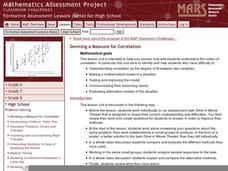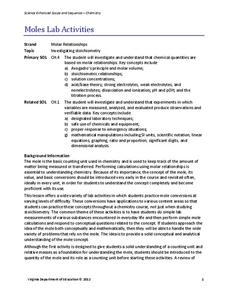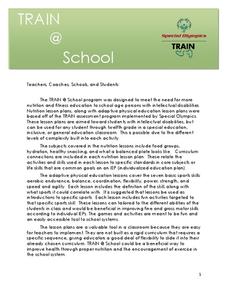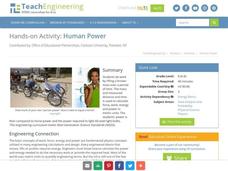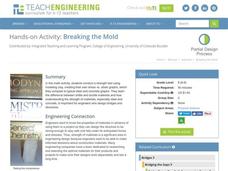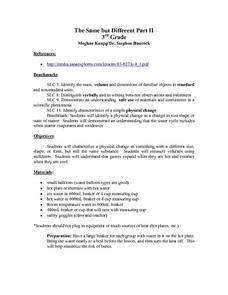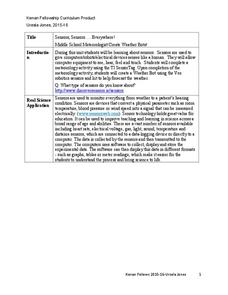media.yurisnight.net
Science Lesson Plan: Our Solar System: I Wonder?
Ever wonder why Pluto isn't considered a planet? Or how large the Earth is compared to the other inner planets? Explore the universe with a series of projects that simulate different aspects of our solar system. The activities require...
Curated OER
Devising a Measure for Correlation
How well does your class understand the concept of correlation? Use an activity to explore different methods of calculating correlation. Working alone and then in groups, your class will make decisions on what math to apply to the...
Curated OER
Moles Lab Activities
General chemistry class members engage in a mini-unit on mole conversions. Through nine lab activites with varying degrees of difficulty, they practice measuring mass and volume, molar calculations, and stoichiometry. Terrific teacher...
American Chemical Society
Solubility Test
Make sure to consult the teacher's handbook, Inquiry in Action - Investigating Matter Through Inquiry, for two demonstrations that can be done to introduce solubility and measuring crystal mass before having the class conduct this...
Mathematics Assessment Project
Identifying Similar Triangles
Math whizzes work with angle sums and exterior angles to figure out the measure of other angles. This particular publication provides comprehensive support in the form of an anticipatory activity, questions designed to prompt discussion,...
Alabama Learning Exchange
Sky High
How are skyscrapers built? What does it take to make a structurally sound building? How can one work within a budget to complete a building project? These guiding questions will be investigated and answered within a hands-on lesson....
Teach Engineering
Density Column Lab - Part 2
Groups suspend objects within layers of liquids to determine the densities of different liquids and compare them to the densities of objects calculated in Part 1. The groups then carefully test their calculations by layering the liquids...
National Wildlife Federation
Massive Migrations
Turn your learners into flocks of migratory birds for this fun lesson on animal migration. Prior to the activity, the teacher creates four different migration routes in the classroom or any available open space, labeling nesting...
Virginia Middle School Engineering Education Initiative
Save the Penguins: An Introduction to Thermodynamics and Heat Transfer
Heat things up in your physical science class with this interactive lesson series on thermodynamics. Through a series of class demonstrations and experiments, young scientists learn how heat is transferred through conduction, convention,...
Special Olympics
Train at School
Keep your mind and body fit with a fun activity about the five food groups. After going over the functions of fruit, vegetables, grains, meats and beans, and dairy, as well as oils and fats, learners participate in a bean bag toss to...
Teach Engineering
Efficiency of an Electromechanical System
How efficient is a motor in a LEGO set? Future engineers conduct an activity where a LEGO motor-generator system raises an object to a specified height. They then show what they learned and use their measurements to calculate the energy...
Teach Engineering
Determining Densities
Don't be dense—use a robust resource. The second installment of a five-part Floaters and Sinkers unit has learners determine the densities of several objects. As part of the activity, they learn the displacement method for finding...
Teach Engineering
Tools and Equipment (Part 1)
Looking for the best inclined plane for the job? Groups calculate the theoretical mechanical advantage for four different inclined planes. They determine the actual mechanical advantage by measuring the amount of force needed for the...
Teach Engineering
Human Power
How many humans does it take to power a light bulb? The 10th part of a 25-lesson Energy Systems and Solutions unit has learners conduct an experiment to calculate power. They then use the results to determine how many classmates they...
Teach Engineering
Ramp and Review (for High School)
Rolling for momentum. As part of a study of mechanical energy, momentum, and friction, class members experiment rolling a ball down an incline and having it collide with a cup. Groups take multiple measurements and perform several...
Teach Engineering
Swinging Pendulum
Get into the swing of things. Pupils use a pendulum to demonstrate the conversion of potential energy to kinetic energy and back. After measuring the speed of a pendulum and compare it to the calculated theoretical speed, they determine...
Teach Engineering
Breaking the Mold
A little too much strain could cause a lot of stress. Groups conduct a strength test on clay. Using books as weights, pupils measure the compression of clay columns and calculate the associated strain and stress. Teams record their data...
Teach Engineering
Water Remediation Lab
Water filtration — that's pure genius! Groups test the ability of a water filter to purify water by running chlorine contaminated water through a filter and measuring the chlorine concentrations as they filter the water. They then graph...
Curated OER
The Same, But Different Part II
Learners characterize a physical change as something that changes to a different size, but retains its basic substance. They measure volumes using milliliters, and perform an experiment that proves that gases expand when hot and contract...
Kenan Fellows
Sensors, Sensors…..Everywhere! Middle School Meteorologist Create Weather Bots!
My forecast is that you'll want to use the resource. Pupils design and create a weather bot as part of a project-based unit. These bots should be able to measure temperature, humidity, barometric pressure, wind speed and direction, and...
Teach Engineering
Quantum Dots and Colors
Introduce teams to quantum dot solutions with an activity that has them expose solutions to a blacklight, observe the colors, and take measurements. Groups graph the data and analyze the dependence between particle size and color...
Teach Engineering
Preconditioning Balloons: Viscoelastic Biomedical Experiments
What does stretching a balloon have to do with equilibrium? Groups explore preconditioning by stretching a balloon to a point of equilibrium. They then measure the amount of force required to stretch the balloon to the same point several...
Columbus City Schools
It’s All Relative
Are the people on the other side of the world standing upside down? Pupils discuss the relationship between movement and position words. The unit explores the concept of reference points through animation, modeling, photography, and more.
Columbus City Schools
What’s Up with Matter?
Take a "conservative" approach to planning your next unit on mass and matter! What better way to answer "But where did the gas go?" than with a lab designed to promote good report writing, research skills, and detailed observation. The...



